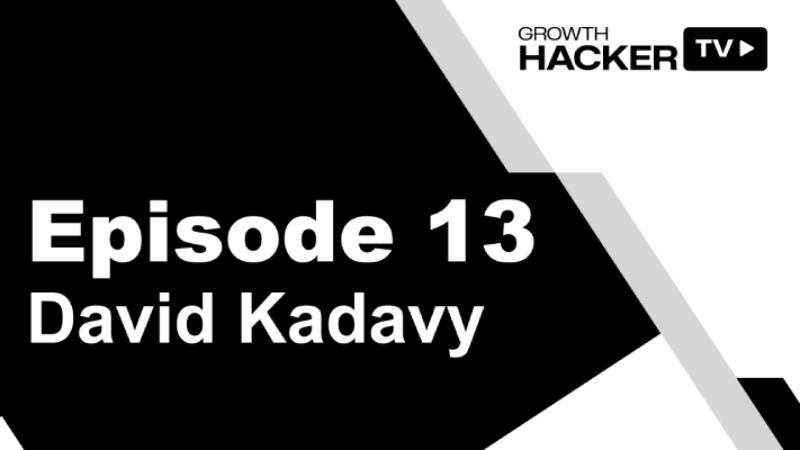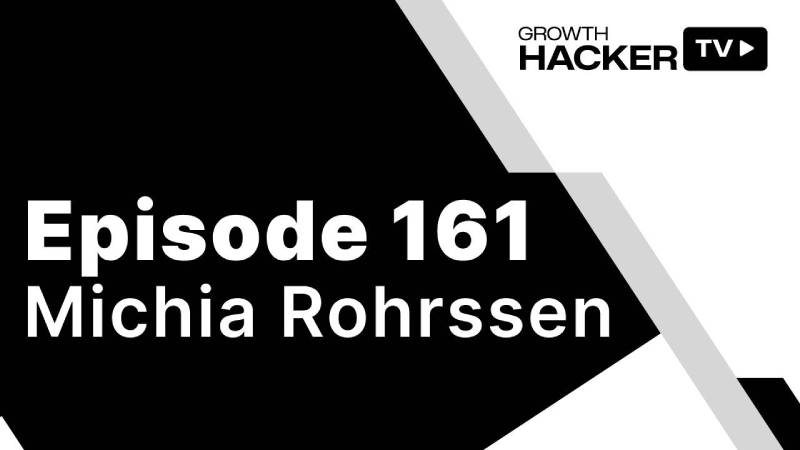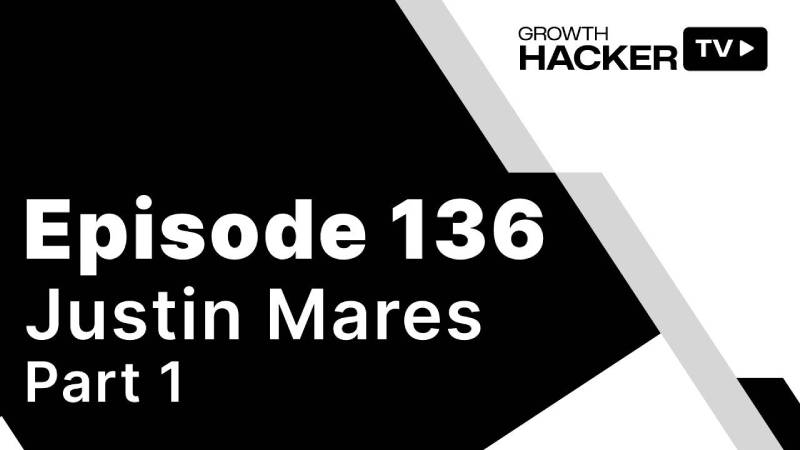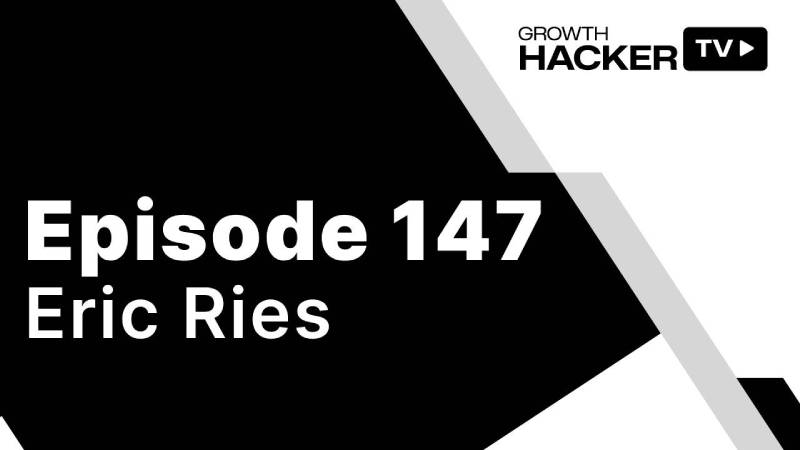Nathan Latka is the principal of Latka Capital; executive producer and host of The Top Entrepreneurs podcast; and CEO at two companies he’s recently purchased. He is also the star of the hit reality show Latka’s Money (more than one million viewers tune in every episode) and CNBC’s Million Dollar Roadtrip.
If you are listening to entrepreneurial podcasts all day long, you probably heard of The Top Entrepreneur Show. In this episode, Nathan reveals his method to give world-class interviews and how he took advantage of distribution channels to become the #1 on iTunes.
TOPIC NATHAN LATKA COVERS
→ His method to give world-class interviews and how he took advantage of distribution channels to become #1 on iTunes
→ He hosted The Top Entrepreneurs podcast a 15-minute daily podcast
→ He interviews top entrepreneurs and ask them in-depth questions about financial metrics and the inner workings of their companies that are not typically shared publicly
→ His approach is to get to the core data quickly
→ The podcast is considered one of the top podcasts in its category and is becoming extremely popular
→ His podcast, The Top Entrepreneurs, became extremely popular
→ He had a strategy in place to achieve success, including recording 60 episodes before launching the podcast
→ He used the episodes as leverage to get high-profile guests
→ He asked guests to promote their episodes to their audience which helped to increase downloads
→ He was expecting a few thousand downloads per month but ended up with 2.3 million downloads in the first 12 months of the podcast’s launch
→ And a whole lot more
LINKS & RESOURCES
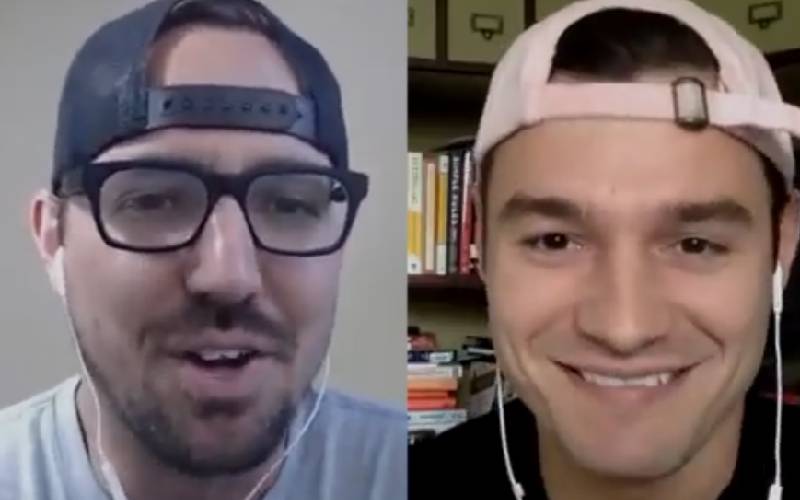
READ THE TRANSCRIPTION
Bronson: Welcome to another episode of Growth Hacker TV. I’m Bronson Taylor and today I have Nathan Latka with us. Nathan, thanks for coming on the program.
Nathan: Bronson It’s dangerous having me on, you know.
Bronson: Why is that? Why is it dangerous?
Nathan: Nathan You know, I sold the company, so now I’m responsible to nobody except myself, which means I can be brutally honest and I can piss a lot of people off or make a lot of people happy. We’ll see what.
Bronson: Happens. That’s good. You know, I like pointy points of view. I like people that stand for something. You know, I tell people all the time, if you can have a product on Amazon, I would rather have a lot of five star reviews and a lot of one star reviews. Not a lot of two and a half star reviews. You know, you got to stand for something.
Nathan: That happens on my podcast. Actually, the top entrepreneurs on iTunes. I got discouraged at first because I was getting so many people putting one like they hated it. And the headlines like I should, you know, like Jimmy Fallon has the shows where it’s like celebrities read their -12. I love like I could do that and I could put like 100 episodes together easy because people are like, this guy is so rude. He doesn’t know how to listen. He cuts people off. And I’m like, That’s because I don’t have time for a two hour episode and I just want the data and don’t care about the guest. I just want the data.
Bronson: You know, you need to do that episode because it’s like the Eminem thing. It’s like you make fun of yourself. They got nothing to say, you know, Oh, you need to put out an episode of like, Here’s the haters hating. And we thought, Yeah, funny mean. Let’s talk about the top podcast. I mean, nothing came out of nowhere. It seemed like, I’m sure behind the scenes it didn’t come out of nowhere. But one day I’m looking on iTunes, it’s number one. And look, who’s this Nathan guy. How is he? Number one with all these other luminaries. So us what is the top podcast and how did you start it? Give us a little background there.
Nathan: Sure. The Top Entrepreneurs podcast, it’s got this beautiful orange logo. I look like a Jonas brother with my head in my hair and all this going on. But all it really is 15 minutes. Every morning at 6 a.m., a new episode gets released. I talk to one of the world’s top entrepreneurs and I ask them everything that I don’t get asked anywhere else. So how much money do you make last month? How much equity do you own your business? What was the valuation when you sold what your revenue per employee? What’s your margin kakapo LTV LTV ratio? Is there a liquidation preference in your series DOCS? Is it a convertible note? I mean, like all of this stuff that founders just don’t share about publicly, I kind of pull out and in 15 minutes and it’s very I mean, Bronson, you know this because you are an interviewer. We’re doing one right now. It is very tough to keep stuff short.
Bronson: Yeah, absolutely. It’s easy to go for an hour. It’s hard to go for 15 minutes. Don’t tell us. Our audience wants to know how you got to number one, right? They got their own hustle. Maybe they’re creating their own content. They’re trying to get to the top of something. What did you actually do? Was it just amazing content and that propelled you forward or was there actually anything you did behind the scenes to help grease the wheels there?
Nathan: Well, yeah, many, many people I’ve had thousands tell me made them. This is content like I’ve never seen before. So, you know, and I obviously take that as a compliment. But I will tell you, the podcast was actually never really meant to have a huge audience. You know, I did it probably the same reason you do this to meet cool people. It’s easier to cold email someone and say, Can I feature on my show versus Hey, can I talk to you one on one on a Skype call? They’re much more likely to say yes if you have a podcast. So it’s like bait, it’s like leverage, you know? That’s very well, right?
Bronson: Absolutely.
Nathan: So when this thing I was expecting a thousand interview downloads a month, 10,000. Well, the first 12 months of it being live, we passed 2.3 million downloads. So something happened here. It hit a nerve. It’s doing very well. And I did one or two things the beginning. It wasn’t all accident. And all the things I did is I recorded 60 episodes before I went live. And in fact, I used I’m going to see if I can grab it real quick. I use a tool. Do you use anything for batching like when you batch meetings?
Bronson: No, I mean, only I use calendar. Is that what you mean?
Nathan: I can use calendar for like scheduling. Yeah. So, like, this is what I did. I’ll show you my schedule now. Today is January 4th, 2017. This’ll probably go out later or early or something, but you’ll see here, like that’s me knocking out and one day a month of interviews.
Bronson: Yeah.
Nathan: Right. Like that’s what it looks like. That’s awesome. So it’s a lot of Red Bull, a lot of shots like five hour energy. I knocked out 60 episodes and then what I did at the end of that was I said, Hey, I, I emailed all the people I interviewed and said, Hey, I’m only going to go live on day one with ten of you and I’m going to pick the ones that are going to email market their lists, their episode. Everyone else will have to wait. Mm hmm. That’s what some of those people are still waiting. I didn’t know that. I didn’t know I was going to do 600 episodes.
Bronson: Yeah.
Nathan: My point is, this is a great lesson in kind of social leverage I created. I had enough supply of episodes where I didn’t need everybody. So I was able to kind of kind of influence people to do self marketing so they could get on and on day one, that’s all.
Bronson: You know, it’s funny you say you recorded 60 when I started Growth Hacker TV, I recorded 50 before anybody knew we existed and then I released 50. I didn’t do the the social scarcity thing. I released all 50, but it gave us like we just came out like a cannon, like, whoa, what is this thing? It’s real. There’s 50 of them. I think there might be an insight there into how to build a content machine without looking. Week on day one. I’ve never heard of rebels doing this. That’s awesome.
Nathan: You can’t look weak on day one, but you also can’t overwhelm people with too much content because they don’t know where to start.
Bronson: That’s what I did.
Nathan: That’s what I have now. I have that as a major problem and there’s 600 episodes. People don’t know where to start. I have to figure out of all that, yeah.
Bronson: I think you can educate them. You don’t have to go through the back catalog. Just tune in today, tune in every day, and it’ll be good going forward. Don’t worry about what you missed. You can’t catch up. That’s what, like this week in tech used to do, saying don’t try to catch up. All right. So you have this incredibly large, powerful audience. And I know now because I have an audience of how much leverage that gives you when you wanna put out a new product, when you want to put on a service, when you want to influence them. Do you recommend building an audience first and then a product or building a product first and an audience around it? And I’ve heard it both ways. What’s your take on that?
Nathan: I think some of the stupidest people alive are these CEOs you meet in networking events where you say, what’s your idea? They say, I can’t tell you because it’s secret and blah, blah, blah. It is so much even even being a CEO and launching on a company that is like so not smart, you know, it’s way smarter by the distribution channels that no matter what company launch, you’re going to have to get access to the people that own the distribution channels are the ones that win. So it’s so much smarter to build a distribution channel than it is to build a product.
Bronson: It’s like the old quote, you know, there’s freedom of the press. If you own one, it’s like own The New York Times. If you want to be in it, that’s easier.
Nathan: Exactly right.
Bronson: Now, I totally agree. I mean, when you own the distribution channel, whatever you put into it, you can create value. It’s like Wal-Mart is the value in their stores. No, it’s in the semi trucks. They can have whatever product they want anywhere in the world and sell it. That’s their value is their distribution.
Nathan: The system will tell you you don’t know this and many people don’t know this. But I raised 2.5 million bucks in my first company here when I was 19. I’m 27 now. I sold that at the beginning of last year and I was 26 and I use a lot like I’m now buying, I’m doing a roll up strategy and a marketing and sales tech space. So at the top end box dot com, you’ll see all these companies I’ve bought. These are distribution channels. All I’m doing is I’m buying tools that have 40, 50, 60,000 daily active users. And when I buy a new tool, I just cross-promote and it grows the utility of the entire tool.
Bronson: Yeah, that’s exactly. We had the CEO of Startup SCO, and that’s what he’s doing. He picks a clarity. Yeah, we’ll. Yeah, we’ll Shari’ah. He picks up clarity and then blast it out to all the people that are also using all the other services. And it’s an instantly new revenue to a new audience that have the same needs. I think it’s a brilliant strategy. I see you building sold Halo. I know you’re out of that game. He did a lot of Facebook marketing. What is the main takeaway from being 19 raising money to then selling the company? What is the one thing where you say that entire experience? This is my takeaway that I’ll hang on to forever.
Nathan: There’s nothing wrong with hitting singles and doubles. We should have sold for years before we did. I didn’t because I want to build $1,000,000,000 company like you read about all over, but every company. So we launched in 2011. All the big social marketing efforts were in 2012. Buddy Media for 600 million Wildfire to Google for 300 million and Volver. You know, all these guys, they all exited in that in that year. And I held on. We had a big, big exit offer. It would have been life changing for me. I held on. I should have sold earlier. So there was nothing wrong with setting up your life where you can consistently hit 50 and 60 million single exits, you know, one or two years. You can get very wealthy doing that.
Bronson: Yeah. Thanks for the transparency. A lot of people don’t want to talk about the missed opportunities, but you learn from those as much as the ones you didn’t. This. Yeah, you’re also a very talented public speaker. I watch you know, some of the YouTube things you can Google, you know Nathan Latka YouTube videos of pop up and I think you’re uniquely talented.
Nathan: Don’t do that.
Bronson: No, you should be uniquely talented at public speaking. And that’s come from someone who does it myself.
Nathan: Well, I would say that if you had to put it in like a sentence or two.
Bronson: Yeah, I would say because, you know, how do you grab their attention? You know how to give them mind splinters. You know how to say something they may know, but in a new way that gets their attention. And you have these tropes and that’s what to talk about, right? So what are some of the topics that you teach on? What are the topics that people hire you to come and teach to their group?
Nathan: Yeah, well, let me tell you the process of like public speaking. First off, I hate doing this, especially people that do it for free. Why would I go on stage and teach everything I know when I could just go be doing it? Like, why would I unless I’m selling some info products, right? Which a lot of people do, right? And they don’t actually do it themselves. I don’t actually like public speaking now. If someone pays me enough, it makes it worth it to get on stage and spill my big things right. Spill the guts. But I always tell them you can’t publish this publicly all over the place. It has to be just the in person audience. And I give away stuff on stage. I show my different bank accounts and how I do flows and all this stuff, you know, my real estate deals, exit prices, all that. But what I will tell you is I go in with kind of an idea of what I want to talk about, some bullet points, but. Bronson. You know this. I show up a day early. I check into the hotel. I hang in the lobby. And I talk to people that have badges on. And I say, Are you here for the conference? And I ask them a simple question. Why’d you come? Like, what are you looking to learn? And they’ll say, you know, Rich Land Freedom Facility. I spoke here in Austin and people were saying, well, I’m a mom of two. I have an Amazon business. Our iPhone case we launched a year ago did a million in sales quick. But now we’re scared because we don’t have many other product ideas and nothing’s doing as well as the first one. We don’t know. We’re gonna pay our bills. It’s like I will literally collect 30 or 40 stories in 24 hours before I actually go on stage. And I will then adapt. It’s like I have a bowl of popcorn. I’ll pick the calls out that are relevant to that audience and then deliver just that smaller bowl of popcorn that’s much more valuable on stage.
Bronson: Now expand that to thinking about business in general, because I think that applies to more than just public speaking. I think you can build a business with that mindset. Do you agree?
Nathan: I’m not sure that I follow you there.
Bronson: So, like actually getting inside the heads of the customers, like actually sitting in the lobby proverbially, like why did you come to this product? What do you hope to accomplish using this product? What are the needs? What are you scared about? What are your pains? What are your hopes, desires? Aspirations. And then realizing, calling all the good stuff from your customers and users. And then feeding back to them the most relevant points in your product, in your marketing, in your whatever with them. Do you agree with that?
Nathan: I do. But here’s the big issue with that. People lie or maybe they’re not like this. Don’t know. They don’t know why they watch growth or TV or they thought a survey you show them to try and figure this out and they just pick something and it’s actually what they’re feeling like you like I agree with what you just said with this caveat. You have to make sure the data you’re actually collecting is totally unbiased. Here’s what I used to do that and you can see how I do it. It’s making like a dot com forward slash Hotjar and this will record when someone hits the top and box, it’ll show me where they’re clicking and where they’re scrolling. That’s much better than sending a survey and say, What’s what feature made you sign up? I can see what featured actually clicking the sign up button and that helps me understand empathy with my users.
Bronson: You know, that’s a really good point. I was actually pitching a V C a month or two ago and I’m sitting around this boardroom and there’s.
Nathan: A company or you’re raising capital for. I we’ll talk.
Bronson: About that later. I’m doing the interview right now.
Nathan: I know. I know. I’m curious. Right.
Bronson: We’ll talk about we’ll talk after we start recording. So so I’m telling them, you know, about my customer development, what I’m learning from the users. And they basically had your point of view. They said, look, be careful because it’s a mix of learning from the customers, but also being visionary and knowing what you want to do and ignoring them because you know what’s better for them than they do. And I’ve come to this place where I think both are valid. Right. You get insights from the customers. No, no, let me rephrase that. You get data from the customers. You have to then turn that into insights and vision. That may not be what they’re actually saying. They’re just giving you information to work with as you decide the vision of what you’re actually doing. So you need both, because if you only go with data, you’ll lose. If you only go with a vision with no input from the users, you’ll lose. You really need robust, you know, on both sides of that. So it’s all yeah.
Nathan: It’s like a customer can tell you they like flower and they like X and they like water. Well, guess what? You still have to figure out if that means you bake a cake or muffin.
Bronson: That’s exactly right. That’s awesome. I love that. All right. Tell me, do you just come up with that? Yeah, that’s amazing. All right.
Nathan: So this has been for us. Ah, so that’s I mean, that’s a stage thing, too, by the way, I will tell you, speaking in metaphors like that, it makes stuff so sticky.
Bronson: You know, I’ve had this thought and I don’t know why, but I think the smartest people speak in metaphors and analogies. I think it’s a shortcut to getting an idea from my brain into yours without all the details. There’s something about like and as metaphors and analogies and similes that really just become mind splinters instantly. And so I agree. I think it’s how smart people think. I think it’s how smart people communicate also. So when I hear somebody using things like that, I’m drawn to it because I know there’s a lot more below the surface to.
Nathan: Oh yeah, this is why academic people are great academics, but making things practical, they can talk way above your head, but they can never tell the common man how to use the thing they just invented.
Bronson: Absolutely. So true. You know what? I’ve been keeping these interviews short because I feel like people have short attention spans and I pack in as much as I can already. I mean, how many great insights are coming out of this thing? So there’s two final questions I want to ask you, and I end every interview with these questions. One, What are you doing right after this interview is over, no matter how boring, no matter how mundane, no matter how awesome. As soon as you stop recording or stop recording, what are you gonna do?
Nathan: I’m turning around right here. I’m in PJs, actually, and I’m laying down in that bed overlooking downtown Austin and taking a nap.
Bronson: Perfect. All right. Last question. What is the best advice you have for any startup that’s trying to grow?
Nathan: Copying is way more sexy and less risky than inventing something brand new. No.
Bronson: Nice unpacking a little bit for us.
Nathan: Copy the hell out of competitors. Once you copy them and you’re beating them, then add your own flair that you think the market. What’s that they lack? It’s way better to copy your competitors like hell.
Bronson: Awesome. Nathan, thank you so much for coming on Growth Hacking TV.
Nathan: Bronson Thanks for having me. See?
Ready To Grow Your Startup?
Get the strategies, motivation, and in-depth interview with all the details every week!
Popular Blog Posts

